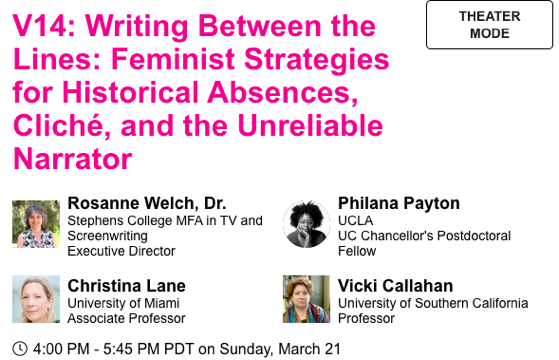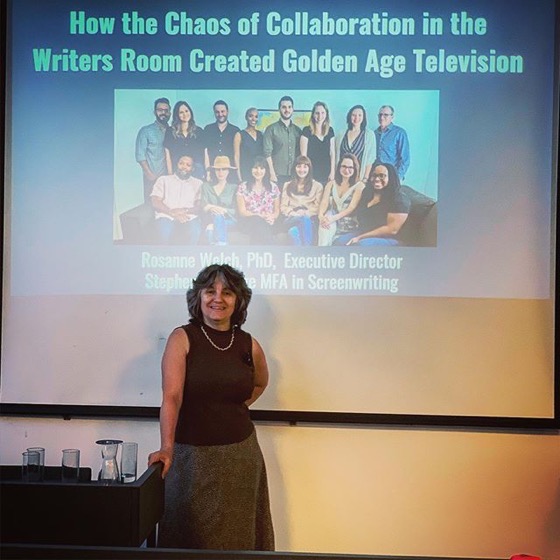Nearly two years ago I had the pleasure of being invited to join a panel at the then upcoming SCMS (Society of Cinema and Media Studies) conference set for Seattle. As you know that was canceled due to Covid with the hopes of reconvening in Colorado in 2021. That became a virtual conference but our group decided to reapply our panel and we four were able to ‘meet’ on Zoom on Sunday and present: Writing Between the Lines: Feminist Strategies for Historical Absences, Cliché, and the Unreliable Narrator.
Here you can watch my part of the presentation,
“When Men Forget Women: The Many Ways Male Screenwriters Fail to Mention their Female Colleagues in Oral Histories”
Our intrepid panel leader, Christina Lane (author of Phantom Lady – the new biography of writer-producer Joan Harrison) kept us connected across the time. Other panel participants included Philana Payton (UCLA) who is researching the memoirs of Eartha Kitt and Vicki Callahan (USC) who covered the career of Mabel Normand. I was happy to highlight the many female screenwriters whose histories were left on the cutting room floor thanks to the unreliable narrators of their work who included directors, film reviewers, and husbands – all who left the female writers out of their own memories.
V14 Writing Between the Lines: Feminist Strategies for Historical Absences, Cliché, and the Unreliable Narrator
Chair: Christina Lane, University of Miami
Co-Chair: Vicki Callahan, University of Southern California
Vicki Callahan, University of Southern California, “Still Looking for Mabel Normand”
Philana Payton, University of Southern California, “Eartha Kitt vs. Eartha Mae: Black Women, Self-Fragmentation, and the Politics of Hollywood Stardom”
Rosanne Welch, Stephens College, “When Men Forget Women: The Many Ways Male Screenwriters Fail to Mention their Female Colleagues in Oral Histories”
Christina Lane, University of Miami, “Alternative Writing Strategies: Notes on Discovering the ‘Women Who Knew’ Joan Harrison”
Podcast: Play in new window | Download
Subscribe: RSS
![Dr. Rosanne Welch Presents “When Men Forget Women: The Many Ways Male Screenwriters Fail to Mention their Female Colleagues in Oral Histories” at SCMS 2021 [Video]](https://rosannewelch.com/wp-content/uploads/2021/03/scms-vidoe-title-card.jpg)

![04 The Comedy Writer’s Room from How The Chaos Of Collaboration in the Writers Room Created Golden Age Television [Video]](https://rosannewelch.com/wp-content/uploads/2021/03/srn-porto-04.jpg)


![03 Managed Chaos from How The Chaos Of Collaboration in the Writers Room Created Golden Age Television [Video]](https://rosannewelch.com/wp-content/uploads/2021/03/srn-porto-03.jpg)


![02 Words Matter. Writers Matter. Women Writers Matter from How The Chaos Of Collaboration in the Writers Room Created Golden Age Television [Video]](https://rosannewelch.com/wp-content/uploads/2021/03/srn-porto-02.jpg)
![01 Introduction from How The Chaos Of Collaboration in the Writers Room Created Golden Age Television [Video]](https://rosannewelch.com/wp-content/uploads/2021/02/SRN-2019-Portugal-.jpg)
![35 Women and Horror from When Women Write Horror with Dr. Rosanne Welch [Video] (44 seconds)](https://rosannewelch.com/wp-content/uploads/2020/11/rmw-cpp-horror-35.png)
![34 More on Get Out from When Women Write Horror with Dr. Rosanne Welch [Video] (1 minute)](https://rosannewelch.com/wp-content/uploads/2020/10/rmw-cpp-horror-34.png)
![33 Get Out and The Last Boy from When Women Write Horror with Dr. Rosanne Welch [Video] (1 minute 28 seconds)](https://rosannewelch.com/wp-content/uploads/2020/10/rmw-cpp-horror-33.png)
![32 Women As Survivors from When Women Write Horror with Dr. Rosanne Welch [Video] (40 seconds)](https://rosannewelch.com/wp-content/uploads/2020/10/rmw-cpp-horror-32.png)